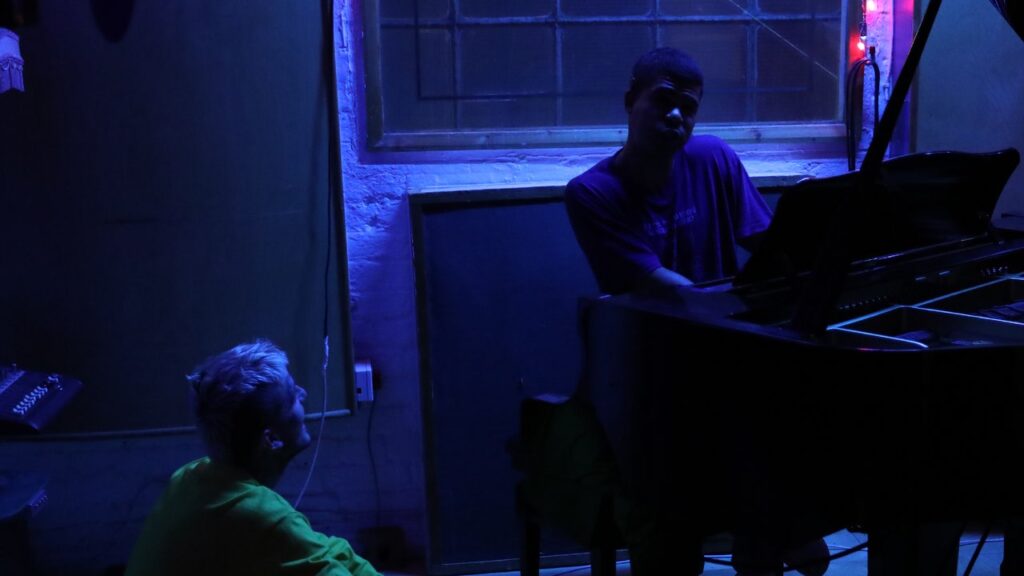
Posthumous rap releases can sometimes leave a sour taste in the mouth. All too often, they are a last-ditch effort at cashing in on an artist’s legacy. In the first two years after Lil Peep’s tragic death, his label released several collaborations that felt stitched-together, even designed for commercial appeal: “Falling Down,” a song Peep recorded before his passing, got an unfinished verse from XXXTentacion, recorded prior to his own death in 2018. Meanwhile, some try-hard bars from Fall Out Boy’s Patrick Stump were awkwardly inserted into “I’ve Been Waiting,” a previously unreleased iLoveMakonnen and Peep collaboration. Since then, Lil Peep’s estate has taken a more sensitive and legacy-minded approach. The focus is now on remastering Peep’s archives and clearing unlicensed samples in his work, instead of constructing new music from the incomplete remains of his recordings.
Both “Falling Down” and “I’ve Been Waiting” originated during Peep’s 2017 sessions in London with Makonnen, which have circulated for several years in bootleg form and now appear in full on the joint album DIAMONDS. According to Peep’s estate, DIAMONDS represents the last “cohesive full body of work” produced by the artist in his lifetime, but it’s also not entirely finished—while many of these songs might sound complete, it’s hard to know whether or not Peep would have kept tweaking with them had he lived, so Gothboiclique producers Fish Narc and Smokeasac, regular Peep collaborators, made a deliberate choice to simply remaster the project rather than add to it. DIAMONDS is not exactly a rough draft, but there’s a sense of looseness that suggests it hasn’t been aggressively curated. The 81-minute runtime is significantly longer than most projects Peep or Makonnen have ever released, resembling a folder of demos more than the tight pop album it might have been.
Makonnen facilitated and approved the tacked-on features from both XXXTentacion and Stump yet those guest appearances feel indicative of how the Atlanta rapper has too often been shut out of hip-hop’s mainstream, in part because of his queerness; it wasn’t enough for the music to stand on its own, there had to be a bigger name attached. DIAMONDS is lightly buffed but largely unpolished, a form that not only preserves the artistic kinship between Makonnen and Peep as pop outsiders, but the queer sensitivity that their work shares. Several months prior to his passing, Peep came out on social media as bisexual, and the pronouns that both he and Makonnen use to refer to their lovers vary throughout the album. Though the two may have inhabited slightly different lanes of rap, they both knew how it felt to be queer men in a frequently hostile industry, and that common experience of identity is part of what drew them together. In an interview with Grammy.com, Makonnen stated that Peep specifically wanted to team up because he felt that a collaborative album from two openly queer hip-hop artists could be a balm to listeners. “[Peep] said, ‘I feel like we can really make a change in the world by showing this because so many of us young fans and young people are dealing with all types of things,’” recalled Makonnen.
In a brief documentary about the LP, producer Fish Narc explains that there was a sense of “joy” that set DIAMONDS apart from previous sessions, with Makonnen’s infectious energy renewing Peep’s focus as an artist. What distinguishes DIAMONDS is that feeling of exuberance, the kind of outright pleasure that can only be generated by two artists joined in creative kismet. There’s a casual affection between Makonnen and Peep that stands in sharp relief to, well, pretty much almost any collaborative project between male rappers you could name. The chemistry is creative, and there’s even a sense of intimacy here. On “Smokin’,” Peep doesn’t show any insecurity about calling Makonnen “baby,” while on “Hocus Pocus,” he coyly thumbs his nose at the no-homo haters: “Want me out the way/Say I’m gay, but they really want me.” DIAMONDS marks an evolution for Peep: He exhibits a newfound vocal confidence, and a sense of freedom around publicly discussing his own identity.
The two artists often function as foils: Makonnen’s voice is bright and bubbly, while Peep’s has a harsher edge. As opposite as they might often sound, both are unafraid to go off-key and offbeat, completely blurring the line between singing and rapping. Tracks like “Nasty Names” and “Sidelines” feature the alt rock-tinged guitars and anguished flow that Peep became known for, but DIAMONDS frequently leaves depressive emo rap behind for up-tempo synth-pop. Mixed in with the trap snares and hi-hats are gentle keyboards, as on “Hypnotized,” or the glistening bells of “Favorite Drug.” Over a propulsive club beat, “November” is a romantic chiptune fantasy, while “Guiltiness” recalls a duo like Erasure or Pet Shop Boys more than any rap tag team. The 12-minute fly-on-the wall jam session “Diamonds Piano Freestyle” documents the pure friendship between Makonnen and Peep, but it also offers an apt metaphor for these once-obscured gems: “I’m a diamond/Just waiting to be found.”
Even on an early song like 2016’s “Beamer Boy,” Lil Peep vocally expressed frustration with the person that he felt fans expected him to be: “They don’t wanna hear that, they want that real shit/They want that drug talk, that ‘I can’t feel’ shit.” On DIAMONDS, Peep explores new sonic directions alongside Makonnen, embracing a sense of positivity that radiates from the project. Where so often Peep rapped about self-destruction, letting his listeners know that they weren’t alone in their emotional pain, DIAMONDS exudes a feeling of uplift, leaving the darkness behind in search of something brighter and more loving.
